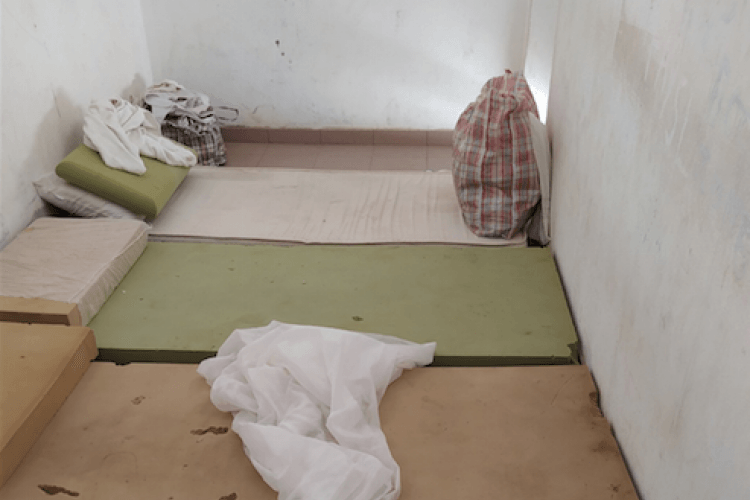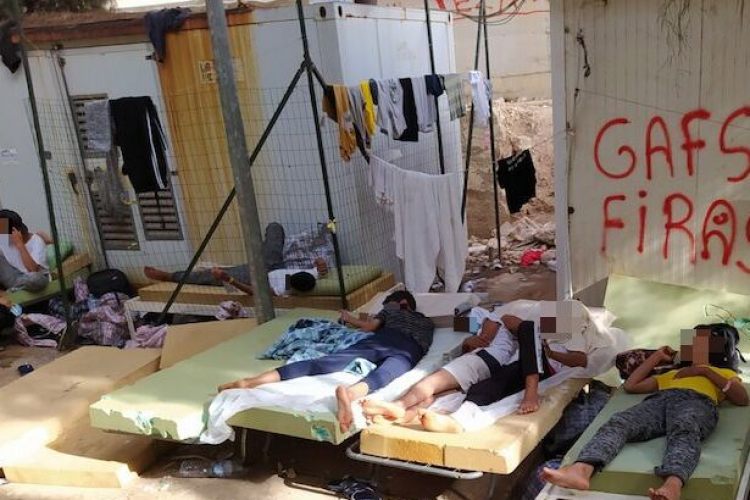The Case of Khlaifia 2011-2021: 10 years of human rights violations in Italian hotspots
Posted:
Time to read:
Guest post by Lorena Bisignano, a Double Degree student completing a Law Degree at the University of Trento and a LLM in International Law and Security at the University of Glasgow, and Gennaro Santoro, a specialist lawyer in immigration law with the Italian Coalition for Civil Liberties and Rights (CILD). Founded in 2014, the Italian Coalition for Civil Liberties and Rights (Coalizione Italiana per le Libertà e i Diritti Civili, CILD) is a network of 43 civil society organisations. CILD aims to defend and promote civil liberties and rights guaranteed by the Italian Constitution and by international law, and to fight civil rights abuses and violations through advocacy, public education and legal action.

From November 30 to December 2, 2021, the Committee of Ministers of the Council of Europe will meet to assess whether Italy has implemented the Khlaifia vs. Italy judgement handed down 5 years ago by the European Court of Human Rights (ECtHR). In 2016, Italy was found in breach of articles 5 and 13 of the European Convention on Human Rights (ECHR). According to the judgement, Italy violated the prohibition against arbitrary detention and did not offer any effective remedies for those detained to pursue in relation to their detention and living conditions in detention. The Grand Chamber of the ECtHR, found that the detention of migrants in Italian Centres of First Aid and Reception (CPSA), today renamed ‘hotspots’, did not meet the requirements of legal detention. For detention not to be considered arbitrary, it is necessary that detention is in compliance with relevant rules of domestic law. This was (and still is) not the case in Italy in relation to detention in hotspots. While there is a specific law on hotspots, that piece of legislation does not mention detention in those centres. In fact, contrary to what happens in relation to other facilities designed to temporarily accommodate migrants, such as Pre-removal Centres (CPRs), hotspots are not qualified as ‘detention facilities’ and therefore, detention therein is not regulated in any Italian law.
Arbitrary detention in hotspots in Italy
Italian law regulates detention in reception facilities for migrants who reach Italy irregularly. Yet, this legislation is applicable only to pre-removal detention centres (CPRs). As a result, deprivation of personal liberty in other facilities is unlawful. Despite the deliberately ambiguous nature of hotspot centres, the way they function and the impossibility for migrants to leave makes them de facto detention centres. As such, without an underpinning legal basis, detention in hotspots must be considered arbitrary and unlawful. Therefore, Italy’s constant reference to the piece of legislation governing detention in CPRs in its observations to the Committee of Ministers is completely irrelevant and potentially misleading, as the legislation does not cover hotspots. In short, despite the 2011 ECtHR ruling, the problems inside Italian hotspots - already analysed in a previous post on Border Criminologies - persist.

The hotspot system in Italy
Hotspots are centres where, on the one hand, humanitarian activities are carried out to assist and accommodate migrants who have just arrived in Italy via the Mediterranean sea. On the other hand, police perform activities to identify, register and ‘classify’ migrants, to assess whether they should be repatriated or not. In short, hotspots perform a hybrid function. Moreover, while they are not typical detention centres, the fact that migrants are not allowed to leave them and lawyers are prevented from accessing them, create a ‘grey area’, effectively turning hotspots into ‘custodial sites’.
This results in additional difficulties for migrants in exercising their rights. The hurdles on lawyers’ access to hotspots casts a shadow on the ability of migrants to access proper information about their fundamental rights, including their asylum requests. Indeed, as has been documented by NGOs active in the field, information is not consistently provided to migrants in hotspots, but rather migrants are given information in an arbitrary fashion on the basis of their nationality, raising questions about the discriminatory nature of this practice.
At present the situation is still the same. Despite the Italian government arguing that improvements in the national law have taken place, such as the strengthening of the National Guarantor for the Rights of Detained People’s powers, the status of those in hotspots, including those who have escaped from Libyan detention centres and/or suffer from serious medical conditions, is still dire. ASGI’s InLimine Project reported that between July and August 2021 many vulnerable migrants, including minors, people with medical and/or psychological condition and victims of gender-based violence, torture, shipwreck and/or human trafficking were detained in hotspot centres for up to one month and were not afforded the medical and psychological support they needed.
Furthermore, civil society organisations see conditions in hotspots as particularly worrisome. For example, last summer, during an active pandemic, there were 1000 people in the Lampedusa centre, which has a capacity of 250 people. Due to overcrowding, measures to avoid the spread of COVID-19 (such as, personal distancing) could not be put in place. Moreover, hygiene was not guaranteed, and people had to live in potentially dangerous conditions.
Lack of effective remedies against detention and related living conditions
In addition to the lack of legal bases for detention, Italian laws do not provide for a remedy to seek redress for the detention or the conditions of detention. The Italian government denied that there was a lack of effective remedies, arguing that migrants in hotspots could file a complaint against their detention and the related conditions under art. 700 Code of Civil Procedure and art. 2043 Civil Code. These articles allow anyone who deems that their rights will suffer an irreparable and imminent harm to seek urgent precautionary measures or receive compensation. However, as civil society organisations have pointed out, these are not effective judicial remedies.
Indeed, these remedies are not specifically aimed at ensuring redress in cases of unlawful detention. Moreover, they are not designed for complaints about detention conditions. This appears to be a huge fault in the Italian system which provides an opportunity for unfettered unfair discrimination, as a specific remedy against poor detention conditions is available to detainees who are not in hotspots (but not to those who are). While Law 173/2020 introduced the possibility for migrants in CPRs to file a complaint against their living conditions before the National Guarantor for the Rights of detained people, this possibility is not available to migrants in hotspots. As such, the Italian government perpetrates unjustified and unfair discrimination amongst differing categorisations of migrants, too. In addition, even if the general remedies proposed by the Italian government were effective (they are not), migrants would not have the chance to resort to them anyway. Indeed, as previously said, lawyers are prohibited from entering hotspots. As a consequence, no legal assistance is afforded to migrants therein detained.

In their communication, CSOs offer a picture of the concrete reality of hotspots centres in Italy. CSOs have been informing the Committee of Ministers of Italy’s non-compliance since 2018, when they first intervened in the implementation procedure. They have also prepared a fully comprehensive dossier on the systematic violations of migrants’ human rights and right to access a remedy in hotspot and CPRs and published a report on the ‘hotspot approach’.
As shown in the documentation provided by CSOs, five years after the Khlaifia judgement, Italy has not provided a legal basis for detention in hotspot centres nor an effective remedy for those detained. To date, hotspots remain centres where human rights and dignity are not protected, and migrants are treated inhumanely. Our collective hope is that the Committee of Ministers will not close the implementation procedure, given the persistent non-compliance of the Italian government, and instead keep it open and ensure that the Italian Government continues to answer for the deficiencies in the systems it oversees.
Any comments about this post? Get in touch with us! Send us an email, or post a comment here or on Facebook. You can also tweet us.
__________
How to cite this blog post (Harvard style)
Bisignano, L. and Santoro, G. (2021). The Case of Khlaifia 2011-2021: 10 years of human rights violations in Italian hotspots. Available at: https://www.law.ox.ac.uk/research-subject-groups/centre-criminology/centreborder-criminologies/blog/2021/11/case-khlaifia [date]
Share:








